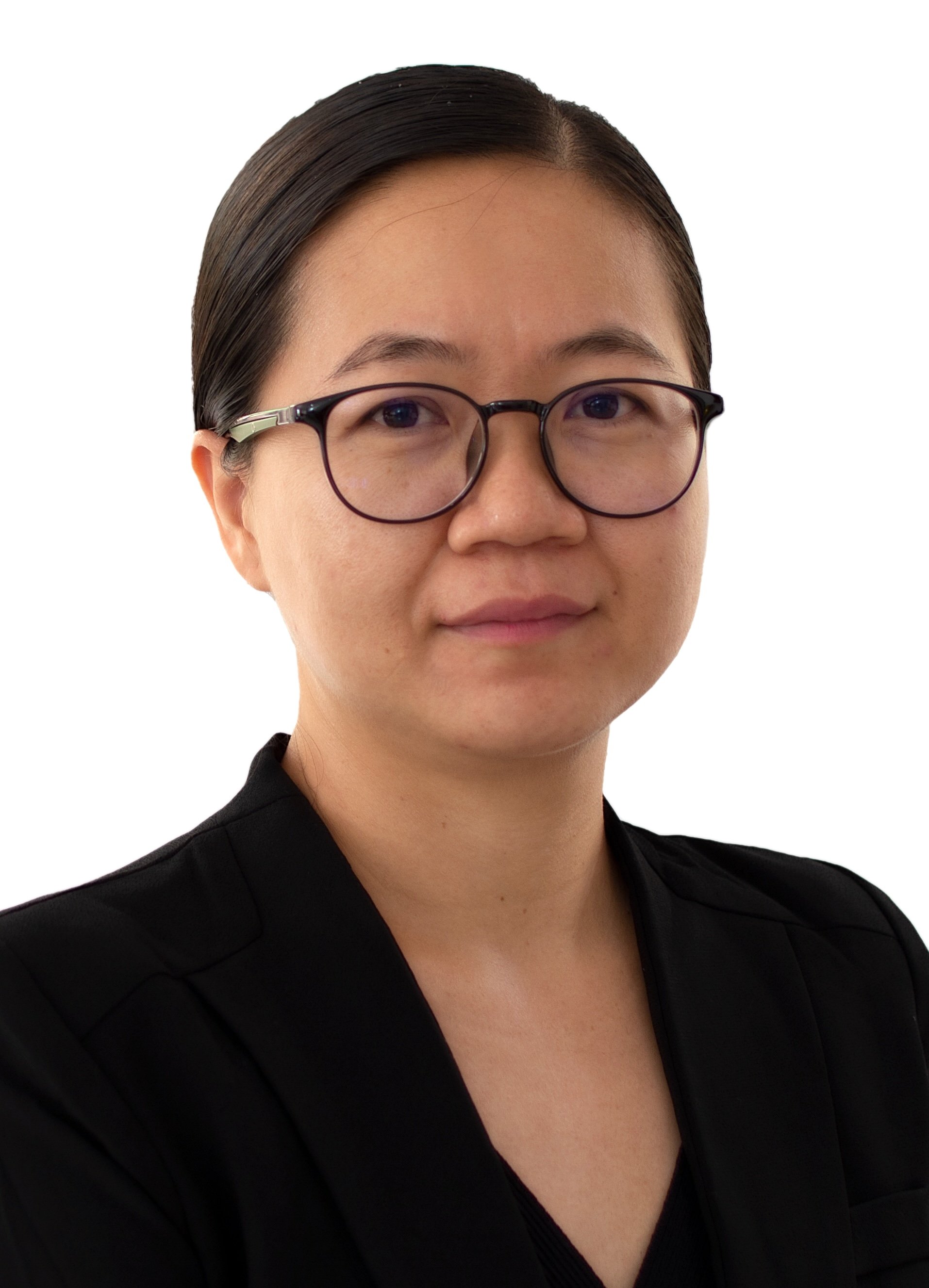 Vuthy Chea
Vuthy Chea
Regional Director, Asia Debt
Incofin Investment Management
Phnom Penh, Cambodia
International Development Studies Program(’08)
Please tell us about your career path so far. What is your area of specialization and how did you come to work in this area?
My career centers on leveraging finance for social and environmental good, mainly in emerging markets. I specialize in impact investing, particularly debt financing for inclusive businesses and financial institutions, with a focus on financial inclusion, sustainable agribusiness, and climate finance.
My early experience at the central bank gave me policy-level insights into boosting financial inclusion in Cambodia. Then came a turning point: around 2010, a global impact investment firm opened an office in the country. My CPA and GRIPS degree in International Development Studies proved a good fit, landing me an investment analyst role in early 2011. This opportunity sparked my passion for bridging capital markets with social impact.
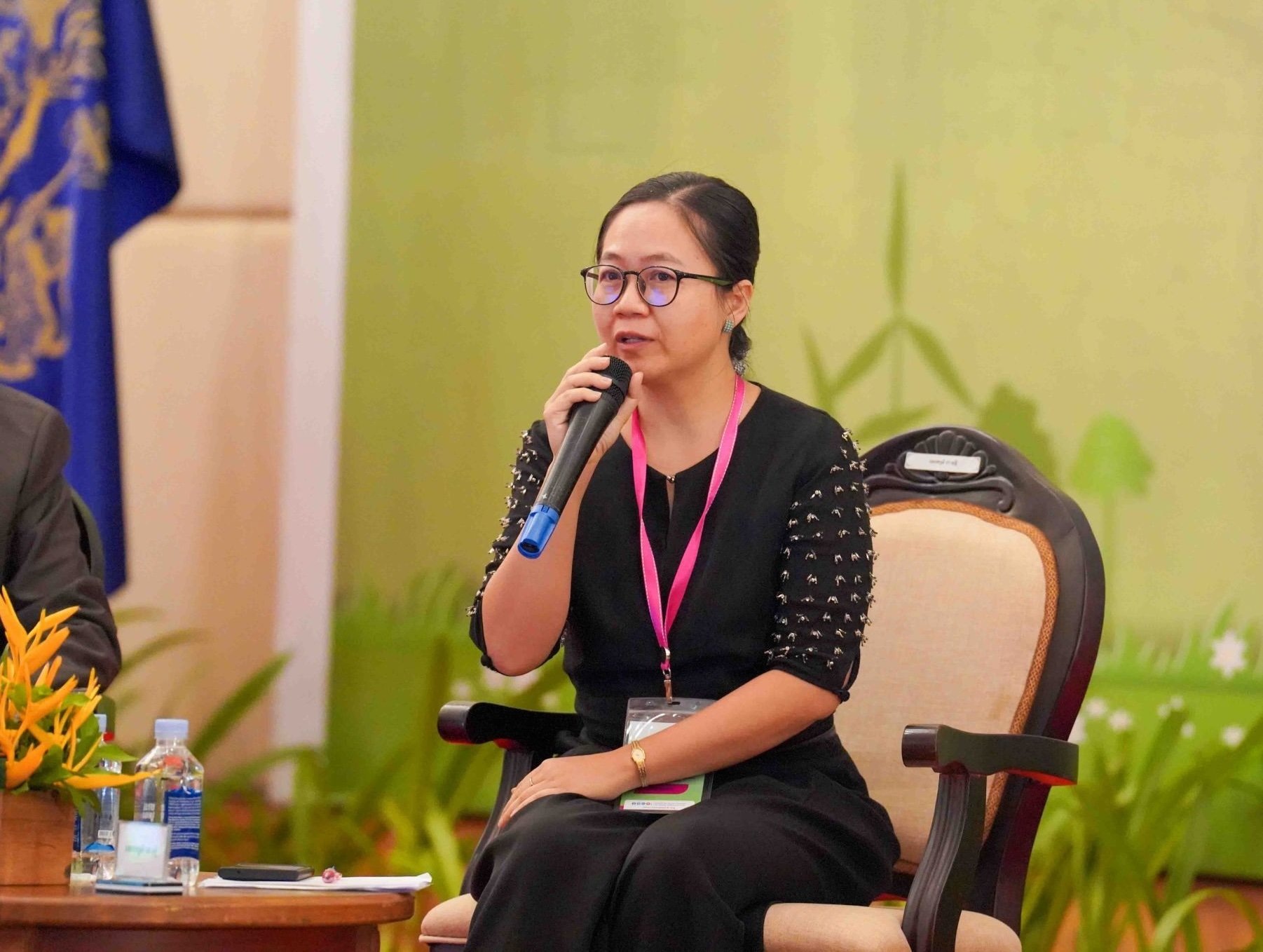
Vuthy on stage
Subsequent roles at BlueOrchard and Incofin further deepened my expertise in structuring debt investments and managing portfolios, constantly balancing financial returns and social impact. Ultimately, this led me to specialize in Asian debt within the field of impact investing, covering South and Southeast Asia, and the Pacific.
You are currently serving as Regional Director Asia Debt at Incofin Investment Management. Please tell us about Incofin and about your main roles and responsibilities.
Incofin Investment Management is a leading global impact investment firm dedicated to promoting inclusive finance and sustainable agriculture in emerging markets. We provide both debt and equity financing to a diverse range of organizations, including financial institutions with a social mission, and agricultural cooperatives. Our aim is to foster financial inclusion, empower vulnerable populations, and contribute to sustainable development.
As the Regional Director Asia Debt, my primary role is to lead and oversee all debt investment activities across the Asia region. I am also the Head of the Cambodia office, the regional hub for debt investment in Asia. This encompasses a wide range of responsibilities, including:
• Strategy Development and Execution: Formulating and implementing the regional debt investment strategy in alignment with Incofin's global objectives and the specific context of the Asian markets.
• Deal Sourcing and Origination: Identifying and building relationships with potential investees, conducting market research, and proactively sourcing new investment opportunities.
• Investment Analysis and Due Diligence: Leading the rigorous assessment of potential investments, including financial, social, and environmental due diligence, and structuring appropriate debt instruments.
• Portfolio Management: Overseeing the performance of the existing debt portfolio in Asia, monitoring risk, and working closely with investees to ensure their success and impact.
• Team Leadership and Development: Managing and mentoring the Asia debt investment team, fostering a collaborative and high-performing work environment.
• Stakeholder Engagement: Representing Incofin in the region, building relationships with investors, partners, and other stakeholders in the impact investing ecosystem.
• Governance/value creation: representing Incofin at the board of the investee.
Reflecting on your five-year journey with Incofin, what milestones are you most proud of, and what lessons have you learned along the way?
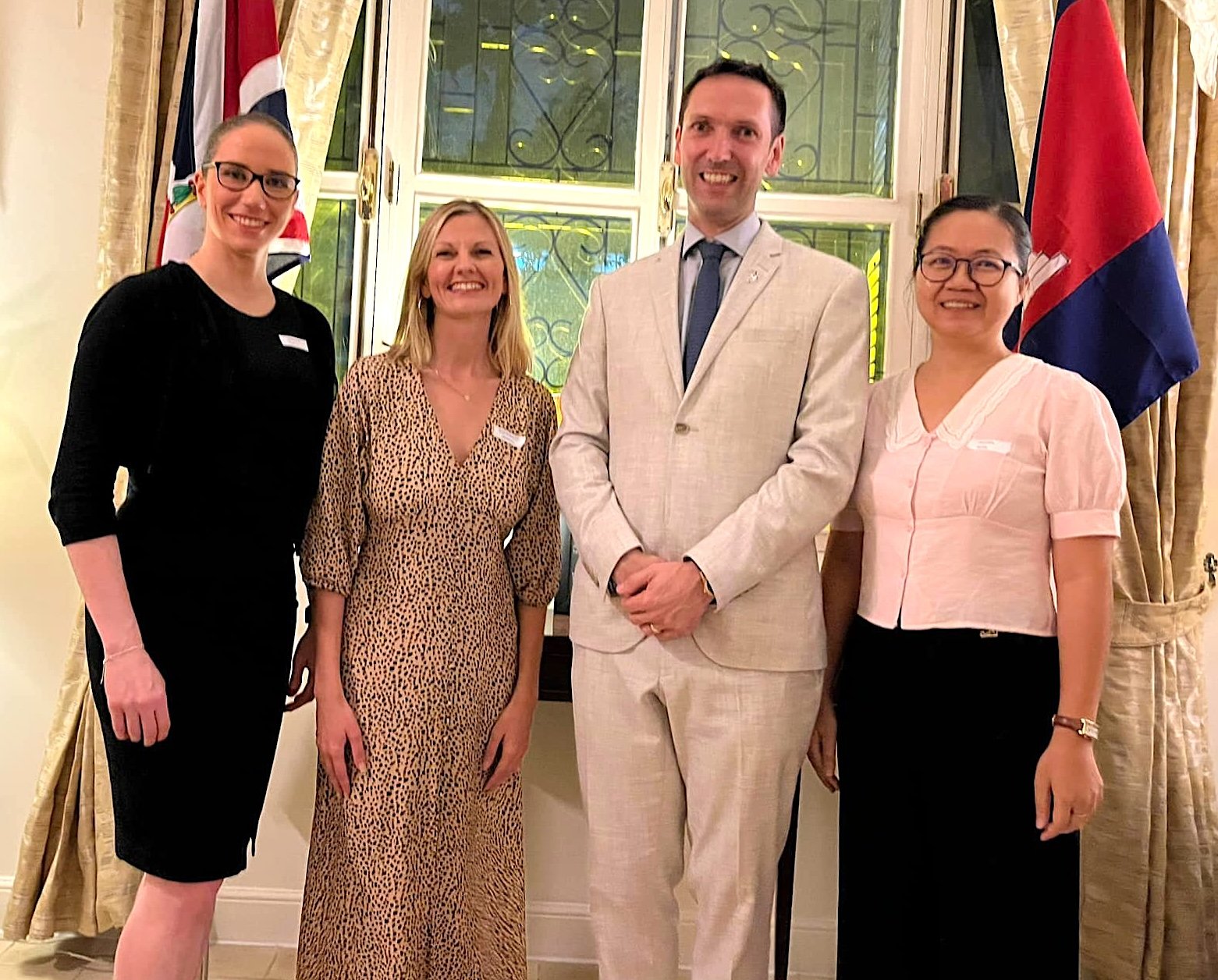
Vuthy with British Ambassador in Cambodia advocate for women empowerment
One of the milestones I am most proud of is the substantial growth and diversification of our debt portfolio across Asia. We have not only expanded our reach into new sectors and geographies but have also broadened the scope of our impact — supporting businesses and institutions that are truly driving positive change in their communities. Another highlight was successfully navigating the many challenges posed by the Asian markets, particularly during the turbulence of the COVID-19 pandemic. Despite the uncertainties, we were able to maintain strong portfolio quality and deliver meaningful social impact, a testament to the resilience of both our team and our investees.
Building a strong and capable team has been one of the most rewarding aspects of my role. Watching our Asia team grow — in both expertise and commitment — has been incredibly fulfilling. Their dedication underpins everything we have achieved. Beyond the numbers, what has been most inspiring is the deepening impact in key sectors. Witnessing firsthand the positive impact our investments have on the lives of individuals and communities across Asia, particularly in areas like financial inclusion for women or sustainable agriculture, has been deeply fulfilling.
Throughout this journey, several important lessons have been reinforced for me. First and foremost, understanding the local context — from cultural nuances to regulatory landscapes — is absolutely critical in impact investing. Equally, the value of strong, trust-based partnerships cannot be overstated; success in this field is built on deep, collaborative relationships with our investees and partners. I have also learned that patience truly pays off. Creating lasting impact requires a long-term vision, resilience through market cycles, and a willingness to stay the course. Finally, adaptability and innovation are vital. The challenges we face are constantly evolving, and to continue making a difference, we must continually find new and creative ways to deploy capital effectively.
Looking back, these years have not only shaped my professional growth but also strengthened my belief in the power of finance as a force for good.
In your current capacity, what do you see as the main opportunities and challenges for impact investing in Asia over the next five to ten years?
In my current role, I see Asia as one of the most dynamic and promising regions for the future of impact investing. Over the next five to ten years, the opportunities here are immense, but so are the challenges that we must navigate thoughtfully.
One of the most exciting opportunities lies in the growing focus on climate and energy. Across the region, there is a rising recognition that addressing climate change is not just an environmental imperative but also an economic one. We are seeing more capital being allocated toward renewable energy, sustainable agriculture, and climate resilience projects — all critical areas where impact investing can be a powerful catalyst for change. Another important trend gaining momentum is gender lens investing. More investors are consciously integrating gender considerations into their strategies, recognizing that empowering women and promoting gender equality can unlock broader social and economic benefits.
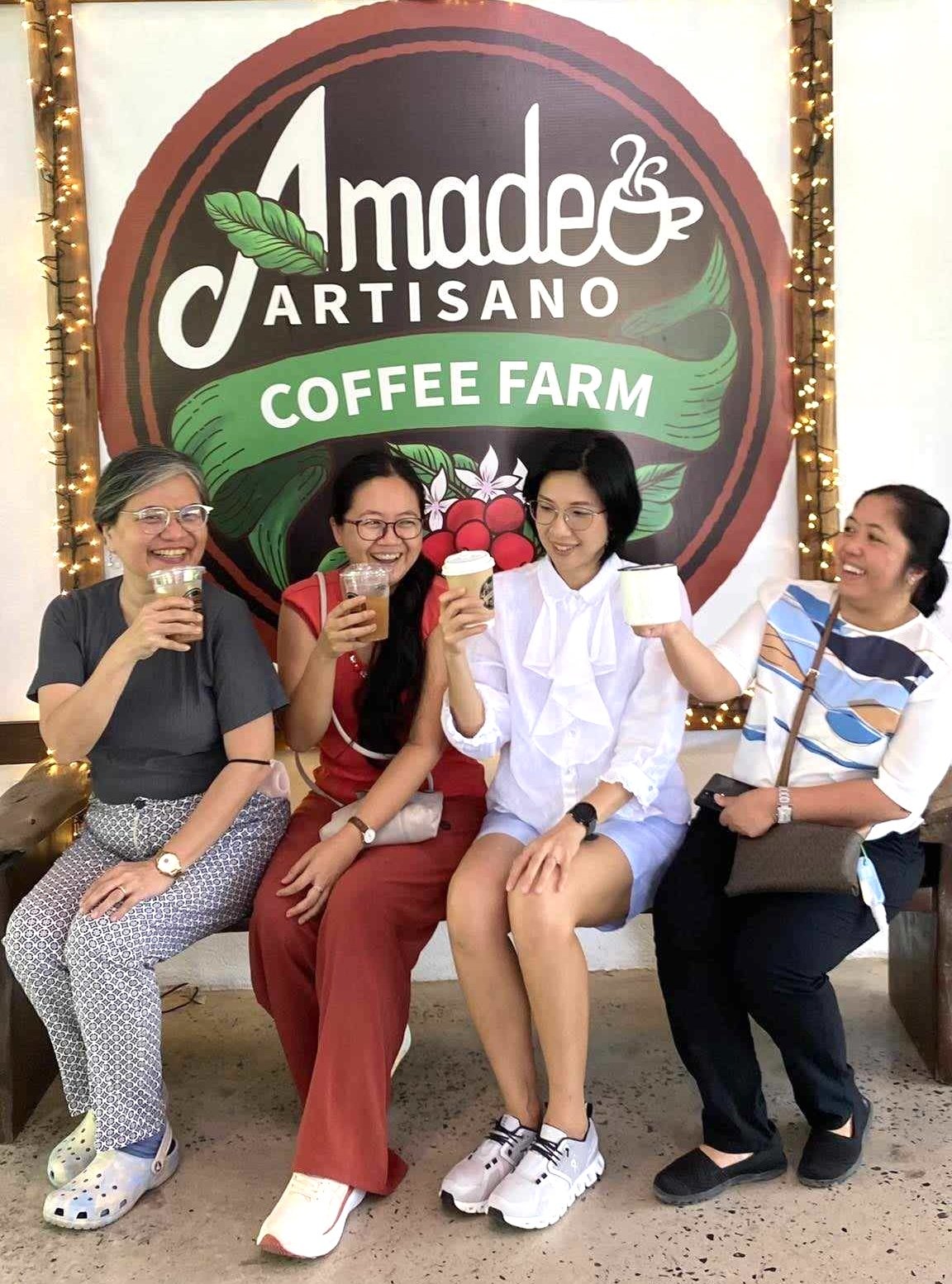
Lovely coffee reunion with former GRIPS classmates in the Philippines
At the same time, we face a range of complex challenges. Geopolitical tensions, shifting monetary policies, uneven economic growth, rising inequality, and theincreasing frequency of climate shocks all contribute to a volatile and unpredictable landscape. Events like trade wars and regional conflicts only add layers of uncertainty. In such an environment, resilience becomes crucial. Despite these difficulties, the markets across Asia have shown remarkable resilience, and there is strong momentum, especially in developing economies. Going forward, collaboration among investors, innovative financing mechanisms, and a willingness to adapt will be essential to drive lasting impact.
Another pressing challenge is ensuring the authenticity of impact investing itself. As the sector grows, so does the risk of "impact washing" — where investments are labeled as impactful without real, measurable outcomes. Addressing this requires rigorous due diligence, transparency, and a strong commitment to maintaining integrity in how impact is defined and reported.
Finally, a core challenge that remains is ensuring that our investments truly reach and benefit the most vulnerable populations. Scaling impact is not just about growing portfolios; it’s about achieving systemic change and making sure that the capital we deploy empowers those who need it most.
Navigating these opportunities and challenges will require creativity, patience, and an unwavering focus on the true purpose of impact investing: using finance to build a more inclusive and sustainable future.
What are some of the biggest challenges you face in your work? And what have been the most interesting or rewarding aspects of your career thus far?
Working in impact investing across Asia is both deeply rewarding and uniquely challenging. One of the biggest challenges I face is finding the right balance between delivering sustainable financial returns for our investors and achieving deep, measurable social and environmental impact. It’s a delicate dance: financial sustainability is crucial for the longevity of any investment, but without a meaningful and lasting impact, we lose sight of the very reason we exist as an impact investor.
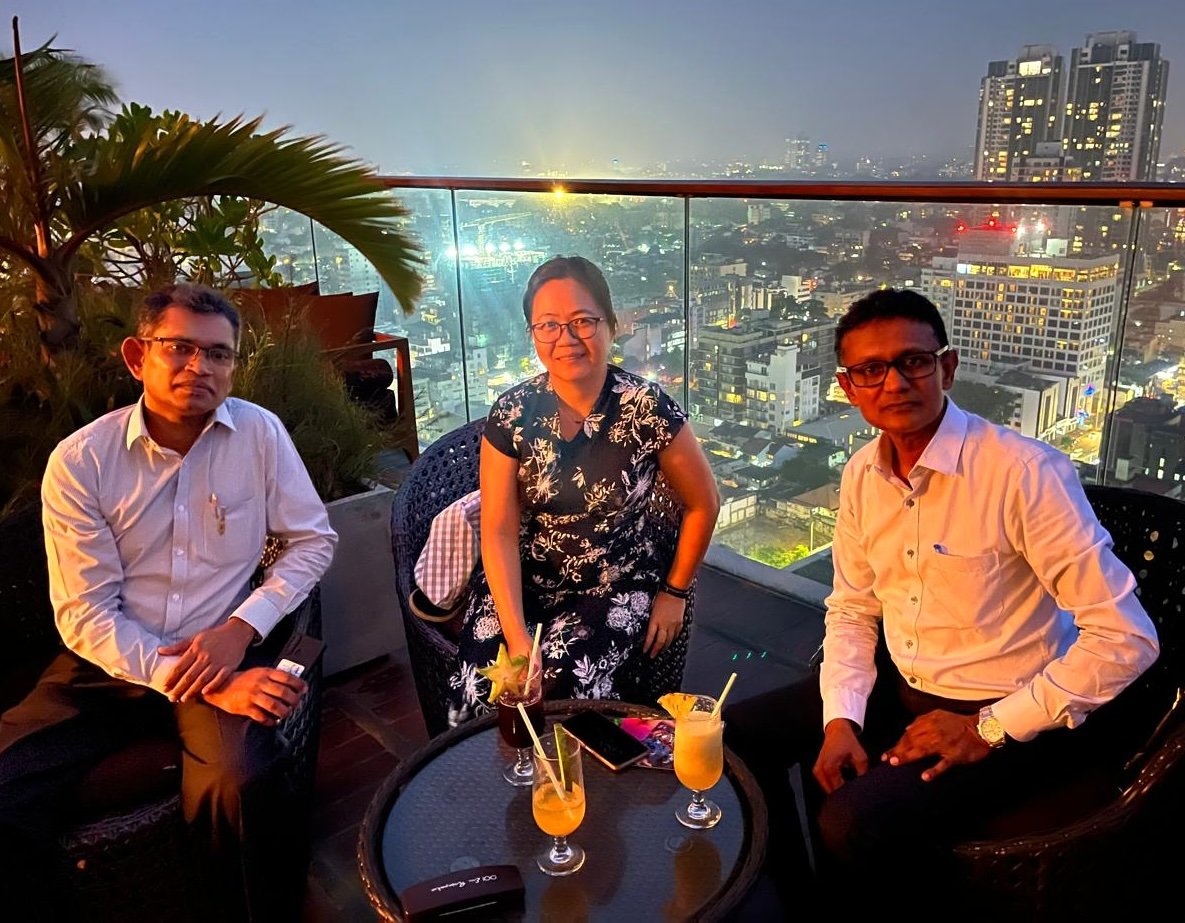
GRIPS reunion in Sri Lanka, 2024
Another ongoing challenge is navigating the diverse and often complex regulatory environments across Asia. Each country has its own set of financial regulations, political dynamics, and cultural nuances. Understanding and adapting to these differences takes time, expertise, and a strong local presence — but it’s absolutely essential for success. Similarly, assessing and mitigating the various risks inherent in emerging markets — from financial volatility to political instability — demands rigorous due diligence and proactive risk management strategies.
Effectively measuring and reporting the impact of our investments is another area that continues to evolve. While the industry has made significant strides, consistently capturing and communicating the true depth of social and environmental change remains a work in progress. Finally, building trust and fostering understanding among a wide range of stakeholders — from investors to local communities — is both an art and a science. It requires clear communication, patience, and a genuine commitment to partnership.
Despite these challenges, my career has been incredibly interesting and rewarding. There is nothing more gratifying than seeing tangible change — knowing that an investment we made has helped a woman entrepreneur access affordable finance, or supported a cooperative in building a more sustainable agricultural supply chain. Working alongside passionate, mission-driven investees and partners continues to inspire me every day. The field of impact investing is dynamic and ever-evolving, offering constant opportunities for learning and growth. Above all, it is deeply meaningful to be part of a broader movement that is redefining the role of finance — proving that capital can be a powerful force for good.
What professional goals are you currently working towards, and where do you see yourself in the next 10 years?
At this stage in my career, my professional goals are centered around deepening and scaling the impact we create across Asia. I’m particularly focused on expanding our reach into more underserved markets and sectors — places where access to capital can truly be transformative. It’s not just about growing the size of our portfolio; it’s about increasing the depth and quality of the impact we deliver.
I'm also passionate about developing innovative financing solutions that better meet the evolving needs of impact-driven businesses. Traditional tools alone aren't always enough; I believe we need to stay agile and creative, designing new instruments that can unlock opportunities where they are most needed.
Beyond individual transactions, I feel a strong pull toward helping strengthen the broader impact investing ecosystem in Asia. Whether through knowledge sharing, cross-sector collaboration, or advocacy efforts, I want to contribute to making impact investing a more mature, resilient, and mainstream force in the region.
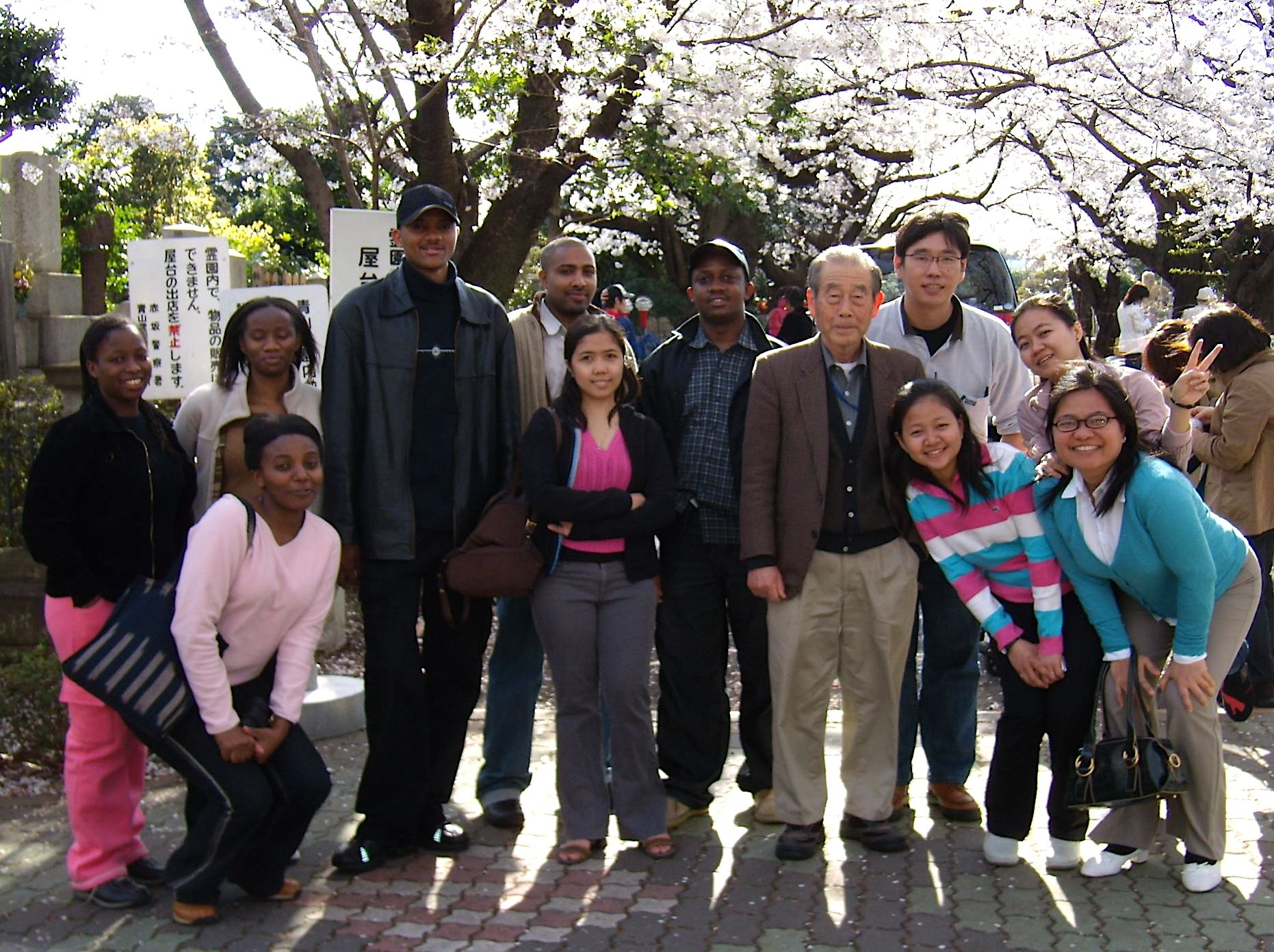
Sakura viewing with Hayami-sensei and classmates at Aoyama Cemetery, nearby GRIPS
Mentorship is another area close to my heart. I see it as both a responsibility and a privilege to help build the next generation of impact leaders — individuals who are not only technically skilled but also guided by strong values. At the very least, I believe we should aim to do no harm, but ideally, we should strive to do far more: to leave systems and communities stronger than we found them.
Looking ahead to the next ten years, I see myself continuing to play a leadership role in the impact investing space, hopefully building and leading an even larger and more impactful platform. Whether by expanding our current initiatives or perhaps launching a new endeavor of my own, my goal is to continue driving meaningful, lasting change across Asia. As the field of impact investing evolves, I’m also excited to explore new asset classes and thematic areas — always looking for where capital can be a real catalyst for transformation.
On a more personal level, I hope to grow not just as a professional, but as a thought leader for the next generation — and just as importantly, to be a good mother to my children, showing them through my work and my life that purpose and ambition can go hand in hand.
What motivated you to pursue studies at GRIPS, and how has your education there influenced your career trajectory?
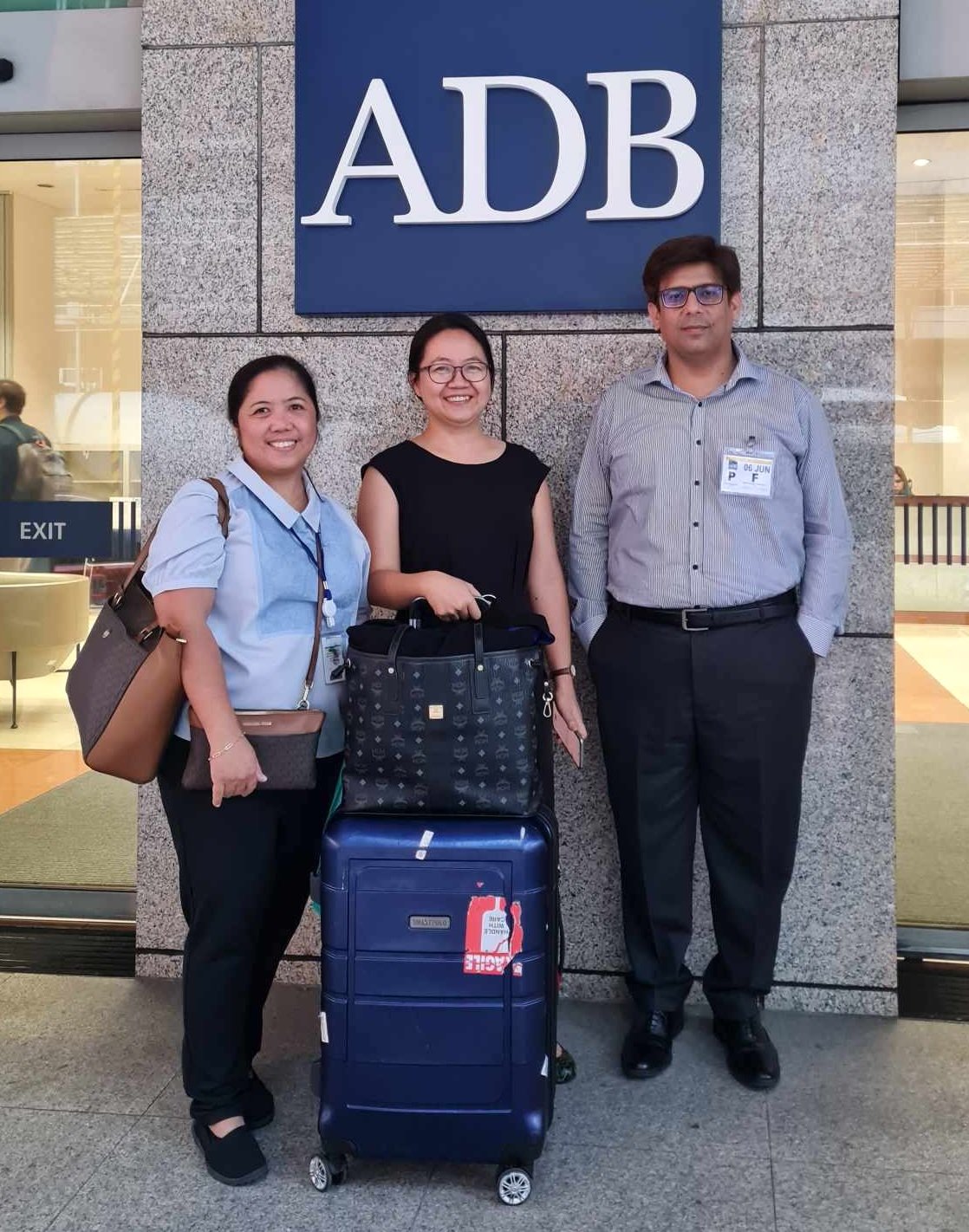
With former classmates Cha and Wasim at ADB Headquarters in Manila
My journey toward pursuing studies at GRIPS began back in Phnom Penh, where I had the opportunity to study Japanese at the National University of Management — which, at the time, was known as the National Institute of Management. From those early days, Japan had always held a special place in my aspirations for higher education. When I discovered GRIPS, it immediately stood out. The master's program in International Development Studies, combined with the internship opportunity it offered, seemed like a perfect fit for my work at the Central Bank. GRIPS' strong reputation in policy analysis, its focus on international development issues, and its location in Japan — a country with a deep and rich development journey of its own — were the key factors in my decision.
My education at GRIPS has profoundly shaped my career trajectory. It gave me a much deeper understanding of development economics, helping me grasp the root causes and broader systemic issues that impact investing seeks to address today. Studying alongside a diverse and talented cohort from all over the world opened my eyes to different cultural, political, and social perspectives — an experience that has proved invaluable as I now navigate the complex and varied markets across Asia.
GRIPS has also offered fantastic networking opportunities, with classmates, professors, and alumni working in development and policy roles globally. Over the years, these connections have been an important source of insight, collaboration, and encouragement.
In essence, my time at GRIPS provided a critical intellectual foundation. Combined with my financial analysis background, my CPA qualification, and the right opportunities that came my way, it ultimately guided me to embark on a career path in impact investing — choosing to become a practitioner working on the ground to drive change, rather than remaining within the sphere of policy-making. It’s a decision I’m grateful for every day.
Have you had any involvement, professional or otherwise, with Japan since your graduation?
Since my graduation, I’ve had several professional interactions with Japan, especially in my roles at BlueOrchard and Incofin. I’ve had the privilege of working closely with Japanese institutional investors, including organizations like JICA and the Sasakawa Peace Foundation. These institutions are increasingly interested in impact investing, particularly in areas such as Gender Lens Investing in Asia. In these roles, I’ve had the opportunity to present our investment strategies and impact theses to them, and explore potential partnerships. One of the highlights was being able to return to Tokyo in 2019. Although my schedule was tight, and I wasn’t able to visit the campus — which I surely missed — it was still a meaningful experience.
On a more personal note, I’ve also maintained strong connections with my GRIPS alumni network. Over the years, I’ve stayed in touch with several classmates who are now working across various fields around the world. It’s always nice to have a familiar face, no matter where I am, especially from countries like Japan, the Philippines, Thailand, Sri Lanka, Pakistan, and Bangladesh. Thanks to social media, we’ve managed to stay connected and catch up, sometimes even via conference calls. It’s wonderful to know that no matter how far apart we are, we can still share our experiences and stay in touch.
How do you maintain a balance between your work and the rest of your life? And when you’re not working, what is your favorite way to relax or spend your free time?
Maintaining a balance between work and the rest of my life is something I actively prioritize. It’s not always easy, but it’s something I’m committed to and continue to strive for. One of the most important things I’ve learned is setting clear boundaries between work and personal time. This helps me create space for both aspects of my life without feeling overwhelmed by one or the other. Effective prioritization and time management are key to making this balance work. I also rely heavily on my strong team, and delegating responsibilities to them has been essential. It’s not just about managing my own time; it’s about trusting and empowering others to share the load.
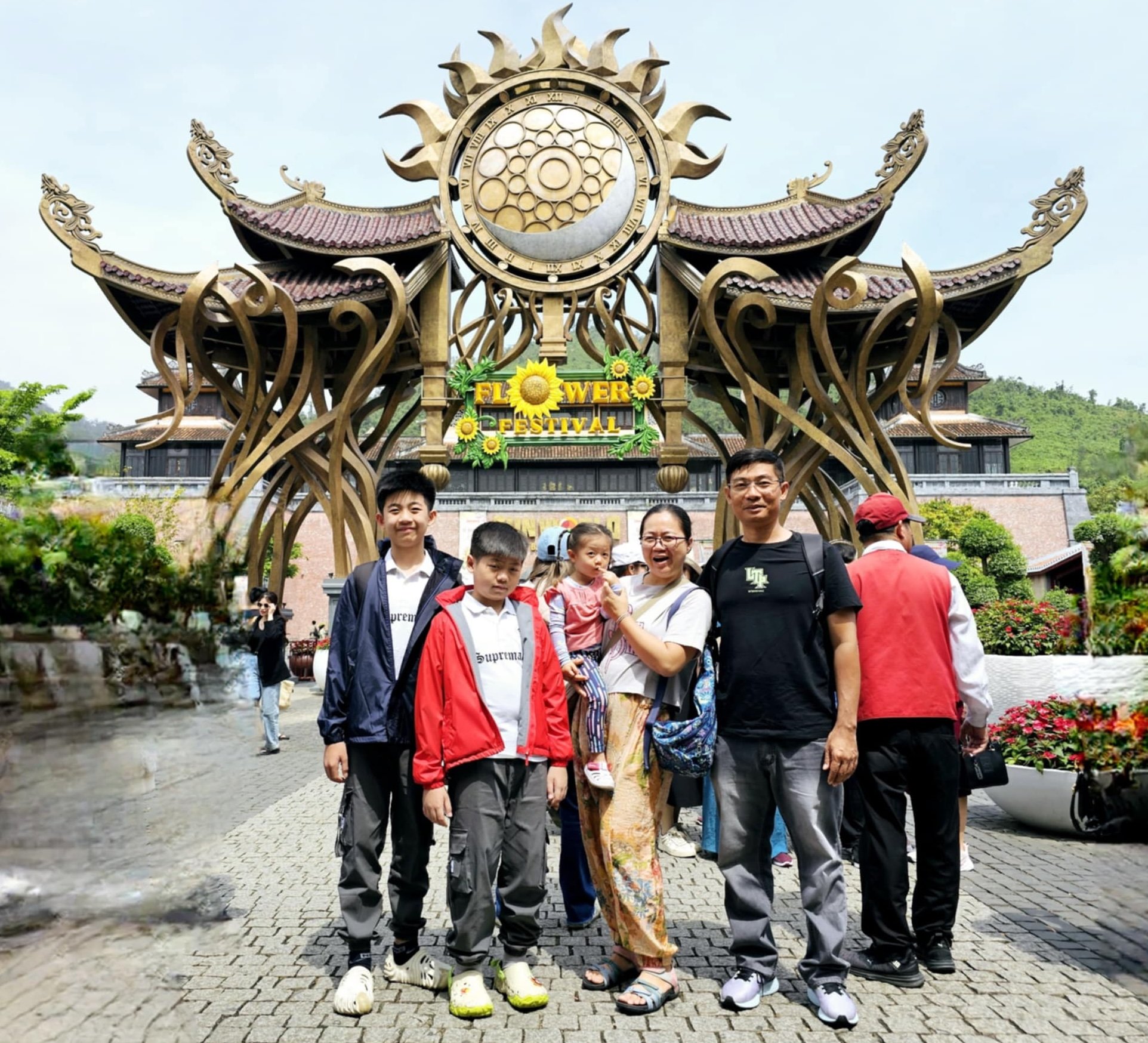 Family fun travel in Vietnam
Family fun travel in Vietnam
Taking regular breaks and family vacations is crucial for recharging and preventing burnout. Even when work travel takes me away, I make it a point to plan family trips during major holidays. Spending quality time with my loved ones not only helps me relax but also keeps me grounded and recharged for the challenges ahead.
I find exploring new places and immersing myself in different cultures both relaxing and enriching. Outside of work, I cherish spending quality time with my loved ones and enjoy being outdoors.
What are some of your fondest memories of your time spent at GRIPS? And what do you miss about Japan?
My time at GRIPS is filled with many cherished memories. One of the highlights was the intellectual stimulation I received in the classroom. The engaging discussions, coupled with the chance to learn from renowned professors and my brilliant, diverse classmates, were incredibly enriching. I especially remember my class with the late Hayami-sensei—he was tough, but the sense of fulfillment I felt after earning a good grade from him was worth every challenge.
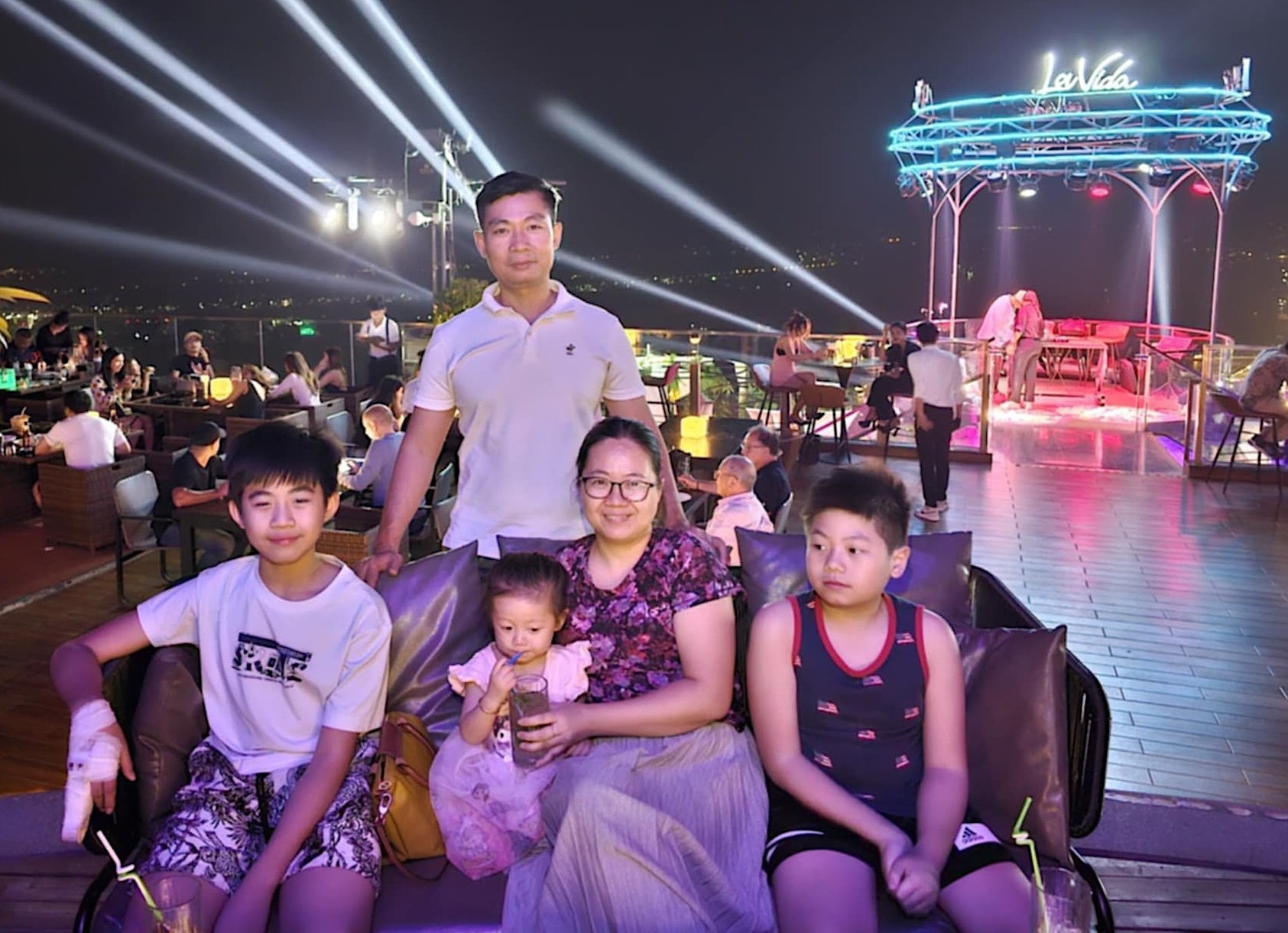
A family night out
Another unforgettable part of my experience was the camaraderie I shared with my fellow students. The International Development Studies (IDS) program was incredibly diverse, and we not only exchanged academic insights but also shared cultural experiences and personal stories. These connections turned into lasting bonds.
Living in Tokyo itself was an experience I’ll never forget. I loved exploring the city and diving deep into Japanese culture, especially during traditional festivals. GRIPS also organized numerous seminars, workshops, and cultural events that provided invaluable learning opportunities and strengthened the sense of community among students.
What always stood out to me during my time in Japan was the kindness and hospitality of the Japanese people. Their warmth, politeness, and willingness to help left a lasting impression on me.
As for what I miss most about Japan, the list is long! First and foremost, the food—whether it’s the delicate flavors of sushi or the comforting warmth of ramen. I distinctly remember learning how to eat persimmons (kaki) in Japan, and the taste of my first bite is still vivid in my memory.
I also miss the safety and cleanliness of Japan, where public spaces are always pristine and there’s a deep sense of security. The respect for tradition and nature in Japan is something I admire deeply, from the tea ceremony to the spectacular cherry blossom (Sakura) viewing. And, of course, the punctuality and convenience of the train rides—the ease of getting anywhere in the city is something I took for granted but now truly appreciate.
Japan was my first international experience, and it was the moment my world truly expanded. Before, I had always been considered a “homy girl,” but Japan helped me discover a whole new side of myself. I absolutely loved it! .
If you could give one piece of advice to anyone considering studying at GRIPS what would it be?
If I could give one piece of advice to anyone considering studying at GRIPS, it would be to fully immerse yourself in the entire experience—both academically and culturally. While it's true that many of our Japanese classmates appeared stressed due to their hardworking nature, I quickly realized that they were also incredibly kind and warm-hearted. Take the time to engage with them—they are truly wonderful people. Network with your diverse cohort of classmates and professors, and seize every opportunity to explore Japan and its rich culture. The GRIPS experience is much more than just academics; it’s about connecting with people and learning from the world around you. The experience is rich and rewarding in ways that extend far beyond the classroom! .
How would you like to maintain involved with the School? What do you expect from GRIPS as an alumnus and do you have any suggestions on how to further utilize the GRIPS alumni network?
I would love to remain involved with GRIPS by giving back to the community, whether through mentorship or guest lectures. I’ve always appreciated the GRIPS SDG Award program, and I hope it continues to grow and inspire future generations of students. As for the alumni network, I believe it could be even more powerful with a more active social media presence. Strengthening connections across different cohorts and encouraging alumni to engage in collaborative projects could create even more value for everyone involved.





